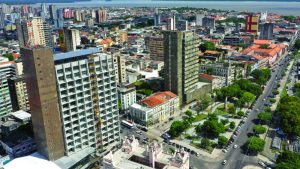Saudi Arabia boasts a strong and resilient economy among the G20 countries, ranking nineteenth as one of the world’s largest economic powers and leading the economies of the Middle East and North Africa region. The Kingdom plans investments worth 3 trillion dollars within the framework of its Vision 2030 projects.
Major global companies such as “Lucid Motors” and “Hyundai” have quickly expanded their presence in Saudi Arabia, benefiting from the impact of sectoral clusters that provide access to integrated supply chains, qualified human resources, and advantages that enhance operational efficiency.
The economic cities in Saudi Arabia offer many advantages, from their strategic locations to providing support at every stage of the investment journey.
These economic cities are comprehensive cities containing diverse and upscale facilities, services, and living standards, in addition to easy transportation to main cities through various channels. They are funded, developed, and operated by the private sector under direct government supervision and support, offering promising solutions and opportunities in business fields (industrial and services), housing, and entertainment with high-quality standards.
In the current uncertain economic conditions, the new special economic zones in Saudi Arabia provide many features such as stability, security, ease of doing business, and a promising future for companies operating within them.
Their goals include attracting value-added investments, diversifying national economic sources, improving public services and living standards, encouraging innovation and entrepreneurship, developing strategic sectors, and providing a suitable environment to explore new business concepts, models, and practices.
In this regard, the Saudi Authority for Economic Cities and Special Zones today launched a new campaign aimed at highlighting strategic sectoral clusters in the Kingdom’s special economic zones, inviting investors worldwide to explore the investment opportunities they offer.
These clusters contribute to attracting quality investments and diversifying the national economic base, consistent with the objectives of Saudi Vision 2030 to increase non-oil revenues and provide sustainable job opportunities in promising sectors.
Major global companies such as “Lucid Motors” and “Hyundai” have rushed to expand their presence in the Kingdom, benefiting from the impact of sectoral clusters that provide access to integrated supply chains, qualified human resources, and advantages that enhance operational efficiency.
The campaign was launched via the Authority’s official accounts on “X” and “LinkedIn” platforms, highlighting four main clusters: the special economic zone in King Abdullah Economic City, which includes the automotive industry cluster in the King Salman Automotive Complex, hosting a select group of prominent investors. The area features advanced infrastructure and integrated logistics services, as well as proximity to King Abdullah Port, enhancing car manufacturing capabilities including electric vehicles. The zone also enables the transport and logistics cluster through multi-modal transport solutions and advanced supply chains.
The second cluster is in the special economic zone of Jazan, focusing on the food industry and agricultural business cluster, benefiting from the region’s natural resources and strategic location on the Red Sea coast near the Bab al-Mandab Strait, one of the most important international maritime trade routes, facilitating exports and enhancing access to global markets.
The third cluster is in the maritime industries within the special economic zone of Ras Al-Khair, part of the King Salman Global Maritime Industries and Services Complex, which includes the largest shipbuilding and marine rig repair dock. This advantage is complemented by the advanced infrastructure of the special economic zone and its strategic location near the Strait of Hormuz, one of the world’s most important maritime passages, giving it attractiveness and a competitive edge to attract strategic investments in the maritime industries sector.
The fourth cluster is hosted by the special economic zone for cloud computing and informatics, featuring advanced digital infrastructure, facilitated establishment procedures, and competitive energy prices attracting global tech companies.













Recommended for you
Talib Al-Rifai Chronicles Kuwaiti Art Heritage in "Doukhi.. Tasaseem Al-Saba"
Exhibition City Completes About 80% of Preparations for the Damascus International Fair Launch
Unified Admission Applications Start Tuesday with 640 Students to be Accepted in Medicine
Egypt Post: We Have Over 10 Million Customers in Savings Accounts and Offer Daily, Monthly, and Annual Returns
His Highness Sheikh Isa bin Salman bin Hamad Al Khalifa Receives the United States Ambassador to the Kingdom of Bahrain
Al-Jaghbeer: The Industrial Sector Leads Economic Growth